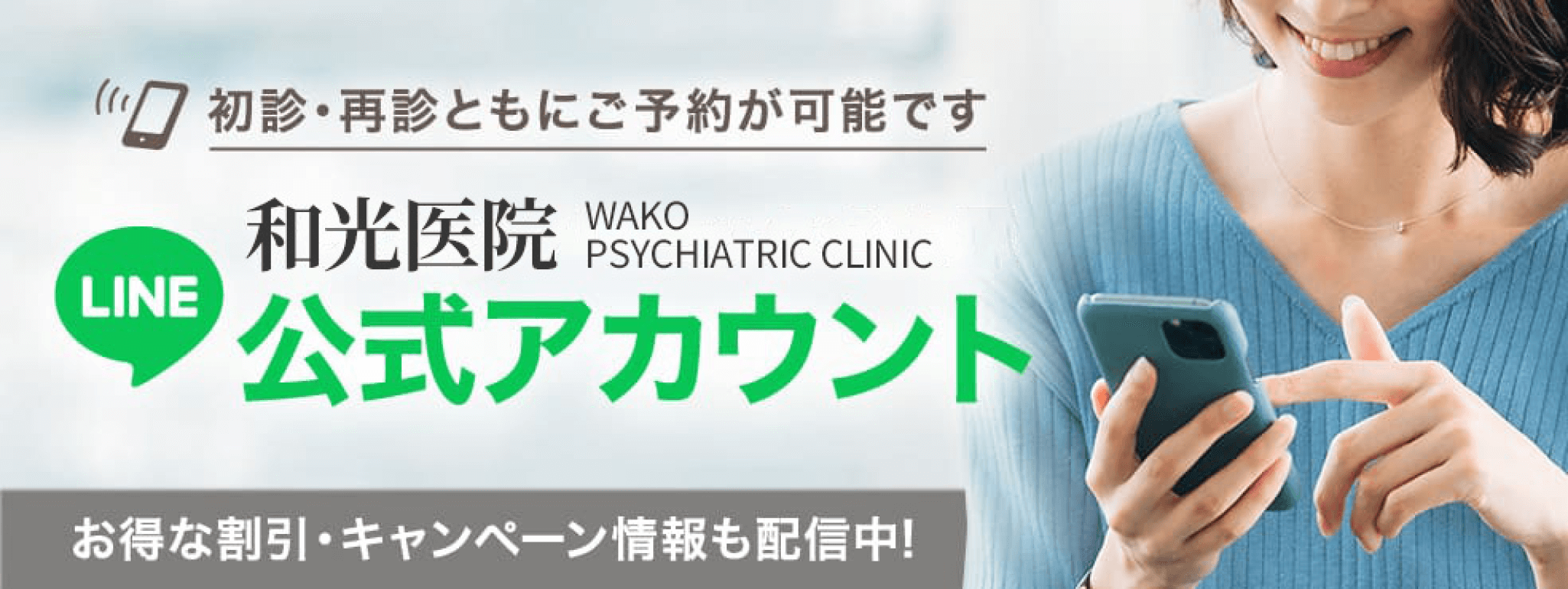ブログ
20歳未満のうつ病患者に対する、TMS治療は有効か?薬物療法と比較した場合のメリットは?名古屋の児童精神科医が解説
20歳未満のうつ病患者に対する、TMS治療は有効か?薬物療法と比較した場合のメリットは?名古屋の児童精神科医が解説
こんにちは、名古屋市千種区 児童精神科専門クリニック、医療法人永朋会 和光医院、加藤晃司です。
今回は、20歳未満のうつ病患者に対する、TMS治療は有効か?薬物療法と比較した場合のメリットは?について解説します。
20歳未満のうつ病患者に対するTMS(経頭蓋磁気刺激)治療は、特に薬物療法が効きにくい、もしくは薬物による副作用が問題となるケースで、有効な治療法の一つとして注目されています。TMSは脳の神経回路に直接作用する治療で、抗うつ薬のような全身への影響が少ないため、若年患者にとって特にメリットがあります。以下に、TMS治療が20歳未満のうつ病患者に有効である理由と、薬物療法と比較した際のメリットについて詳しく解説します。
- TMS治療の特徴とメカニズム
TMSは、脳の特定部位(通常は前頭前野)に磁気パルスを与えることで、脳の神経活動を調整する治療です。磁気パルスが脳に到達することで、神経細胞の活動が活性化し、気分や感情をコントロールする脳領域の働きが改善されます。
直接的な神経刺激:TMSはうつ症状に関連する脳の神経回路(特に前頭前野)に直接作用します。薬物療法は神経伝達物質を調整しますが、TMSは脳の神経ネットワーク全体の働きを改善する効果が期待できます。
局所的な刺激:TMSは磁気パルスを特定の部位に照射するため、全身への影響が少なく、副作用が少ない点が特徴です。
- 20歳未満の患者に対するTMSの有効性
若年層へのTMS治療の有効性については、研究が進行中ですが、いくつかの報告がその効果を支持しています。
- 早期の症状緩和
TMS治療は、数週間の治療セッションでうつ症状が緩和されるケースが多く、薬物療法よりも早期に効果を感じられることがあります。特に、薬物に反応しにくいケースや、薬物の副作用が強いケースで、有効な代替手段として評価されています。
- 副作用が少ない
TMSの副作用は一時的な軽い頭痛や頭皮の刺激程度にとどまり、薬物療法と比べて副作用が少ないため、若年層にとって安全な治療オプションです。若年患者の場合、薬物による眠気や体重増加、胃腸の不調などの副作用が学業や日常生活に支障をきたすことが多いですが、TMSはこうしたリスクが抑えられます。
- 認知機能への影響が少ない
一部の抗うつ薬は認知機能(記憶力や集中力)に影響を与えることがありますが、TMSは認知機能への悪影響がほとんどありません。若年層はまだ学習や発達の段階にあるため、認知機能への影響が少ないTMSは、生活の質の向上や社会生活への適応維持に役立ちます。
- TMS治療と薬物療法の比較によるメリット
- 副作用の少なさ
薬物療法の副作用:若年層のうつ病患者には、体重増加、眠気、集中力の低下、不安感、消化不良など、抗うつ薬の副作用が強く現れる場合があります。これらは学業や友人関係、日常生活に影響を及ぼしやすく、薬物療法の継続が難しい原因になることもあります。
TMSの副作用の少なさ:TMSは局所的な磁気刺激であるため、全身的な副作用が少なく、症状改善を促進する一方で、若年患者にとって心理的・身体的負担が軽減されるというメリットがあります。
- 依存性がない
一部の抗うつ薬は長期使用後の中止時に離脱症状が現れることがありますが、TMSには依存性がなく、治療後の離脱症状もありません。このため、治療が完了した後に通常の生活へスムーズに戻れる利点があります。
- 薬物治療が難しい患者への有効性
20歳未満の患者は、身体の発育段階にあるため、薬物の長期使用が身体やホルモンバランスに影響を及ぼす可能性があります。薬剤に対する拒絶反応や副作用が強く現れる場合でも、TMSは代替治療として有効な選択肢です。
- 生活の質(QOL)の向上
TMSは集中力や認知機能に悪影響を与えないため、勉強や部活動、友人関係などの社会活動に支障が出にくく、若年層の生活の質が保たれやすいことがメリットです。薬物療法による認知機能の低下や眠気は、若年層の学業成績や自己評価に悪影響を与える可能性があるため、TMSの認知への安全性は大きな利点です。
- TMSの治療効果と限界
TMSは若年層に対しても効果が確認されているものの、適応に関する慎重な判断が必要です。また、TMSは必ずしもすべての患者に効果があるわけではなく、重度のうつ病や合併症がある場合、効果が限定的なケースもあります。
効果の持続期間:TMSの効果は個人差があり、症状の再発を防ぐためにメンテナンス治療が必要な場合もあります。
適応症例の選定:薬物療法で効果が見られない、または副作用が問題となる患者に適しており、医師による慎重な診断が求められます。
- 若年層におけるTMS治療の今後の展望
若年層へのTMSの効果に関する研究は進行中であり、将来的にはより広範囲の症例に対して適用される可能性があります。また、TMS治療は技術が進化しており、刺激強度や周波数の最適化により治療効果の向上が期待されています。
まとめ
20歳未満のうつ病患者にとって、TMS治療は薬物療法と比較して以下のようなメリットがあります:
副作用が少ないため、身体への負担が軽減される。
認知機能や集中力への悪影響が少なく、生活の質が維持されやすい。
依存性がなく、治療完了後もスムーズに通常生活へ戻りやすい。
薬物療法が難しいケースにも代替治療として有効である。
当院では多くの20歳未満の患者さんにもTMS治療を利用していただいています。
モニターも募集しておりますので、ご興味のある方はクリニックにお問合せください。
当院ホームページはこちらより
ご予約は公式ライン、ホームページから可能です。
友達追加はこちらから↓
当院インスタグラムはこちら
https://www.instagram.com/wako_iin/
子どものためのメンタルクリニック
医療法人永朋会 和光医院
児童精神科・精神科・心療内科
〒464-0092 愛知県名古屋市千種区茶屋が坂1丁目12番2号
電話 : 052-712-1777
地下鉄名城線「茶屋ヶ坂」駅 1番出口より徒歩3分
地下鉄名城線「砂田橋」駅 1番出口より徒歩10分
Hello, I’m Dr. Koji Kato, a child psychiatrist at Wako Clinic in Nagoya.
Today, I’ll explain the effectiveness of TMS (transcranial magnetic stimulation) treatment for depression in patients under 20 years of age and discuss its advantages compared to pharmacotherapy.
TMS has emerged as a promising treatment option, particularly for young patients who may not respond well to medication or experience adverse effects from it. Unlike medications, TMS directly stimulates neural circuits in the brain with minimal systemic effects, making it particularly beneficial for younger patients. Below, I’ll go into the reasons TMS is effective for younger patients and the benefits of TMS compared to medication.
- Characteristics and Mechanism of TMS Treatment
TMS works by applying magnetic pulses to specific brain areas (usually the prefrontal cortex) to regulate neural activity. When these pulses reach the brain, they activate neurons, improving the function of areas involved in mood and emotion regulation.
Direct Neural Stimulation: TMS directly targets neural circuits linked to depression, often achieving results by rebalancing the brain’s neural network, whereas medication mainly adjusts neurotransmitter levels.
Localized Stimulation: TMS only affects specific areas, resulting in fewer side effects compared to medications that impact the entire body.
- Effectiveness of TMS for Patients Under 20
Research on TMS in younger patients is ongoing, but several studies support its effectiveness.
- Faster Symptom Relief: TMS sessions over several weeks can lead to symptom improvement faster than medications in some cases. This is especially true for patients who don’t respond to medications or experience significant side effects.
- Minimal Side Effects: TMS’s side effects are generally mild, such as temporary headaches or scalp irritation, making it safer for young patients. Side effects from medications—like drowsiness, weight gain, and gastrointestinal discomfort—can often interfere with daily life, but TMS has minimal impact.
- Limited Cognitive Impact: Unlike certain antidepressants, which can affect memory and concentration, TMS has little to no adverse effects on cognitive function. Since young patients are still in their formative years, preserving cognitive function is crucial for maintaining quality of life and social engagement.
- Comparison of TMS and Pharmacotherapy: Key Advantages
- Fewer Side Effects
Medication Side Effects: Side effects in younger patients may include weight gain, drowsiness, reduced concentration, anxiety, and digestive issues, which can disrupt schoolwork and relationships. These side effects often make it hard to continue medication.
Minimal TMS Side Effects: As TMS is a localized, non-systemic treatment, it has fewer side effects, which means less physical and mental stress for young patients.
- No Dependency
Some antidepressants may cause withdrawal symptoms after prolonged use, but TMS has no dependency or withdrawal issues, allowing patients to return to their regular lives smoothly after treatment.
- Efficacy for Patients Unable to Tolerate Medications
Since patients under 20 are still developing, long-term medication can impact their bodies and hormone levels. For those who experience strong adverse reactions to medications, TMS offers an effective alternative.
- Improved Quality of Life
TMS doesn’t impact concentration or cognition, so activities like studying, social interactions, and sports aren’t affected. This is especially important for young patients, as cognitive impairment from medication can influence academic performance and self-esteem.
- Effectiveness and Limitations of TMS Treatment
While TMS has shown positive results, careful consideration is needed when determining its suitability. TMS isn’t universally effective for all patients, and in cases of severe depression or multiple comorbidities, results may be limited.
Duration of Effectiveness: TMS effects vary between individuals, and maintenance sessions may be necessary to prevent symptom recurrence.
Patient Selection: TMS is recommended for patients who haven’t responded to medication or experience significant side effects, based on careful diagnosis and evaluation.
- Future Prospects for TMS in Younger Patients
Research on TMS for younger patients is still evolving, and as we gain more insights, it may become applicable to a broader range of cases. Advances in TMS technology also promise improved outcomes through optimized stimulation intensity and frequency.
Summary
TMS offers several advantages over pharmacotherapy for depression in patients under 20:
Fewer side effects, reducing physical stress.
Minimal impact on cognitive function, allowing better quality of life.
No dependency or withdrawal, allowing for smooth resumption of normal life.
Effective as an alternative for patients who cannot tolerate medication.
At our clinic, we have helped many patients under 20 with TMS therapy. We are also recruiting monitor patients for TMS treatment, so please feel free to contact us if you’re interested.
受診される方へ
初めて受診される方
当院は予約制をとっておりますが、初診の場合は若干のお時間をいただくこととなり、お待ちいただくことがあります。スムーズにご案内する為に、WEB問診のご利用をおすすめいたします。
WEB問診はこちら >
初診予約は電話にてお願いします。
再診される方
お電話もしくは予約システム(チェック・オン)から予約を取ることもできます。予約の変更や取り消しをご希望の場合には、診療時間内に受付にお電話いただくか、予約システムから変更・取り消しを行ってください。
パソコン・携帯から簡単にご予約できます。
和光医院 診療時間のご案内

【診療時間】
午前 9:00〜13:00
午後 15:00〜18:00
土曜 9:00〜14:00
【休診日】 日・祝日
患者様へのご案内
- 明細書について:当院では、療養費規則に基づき明細書の発行を無料で行っています。
- 一般名による処方について:後発医薬品が存在する場合は、商品名ではなく一般名(有効成分名)で処方することがあります。
- 医療情報の活用について:当院では、安心な医療を提供する為、オンライン資格確認や電子処方箋データ等の情報を活用して診療を行っています。


